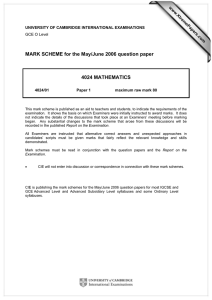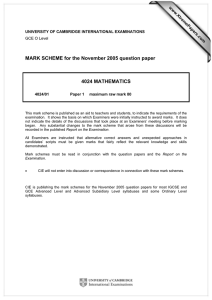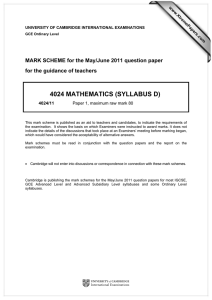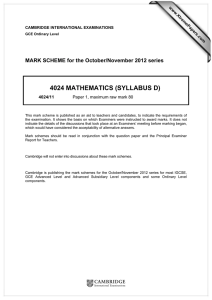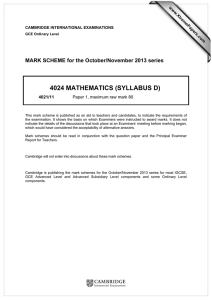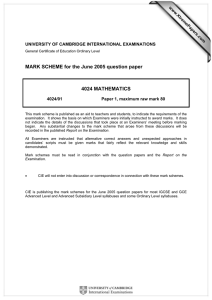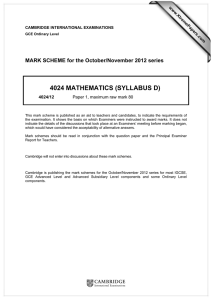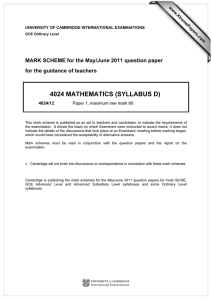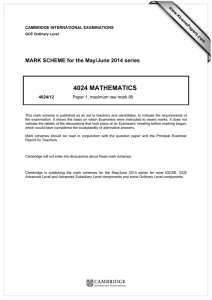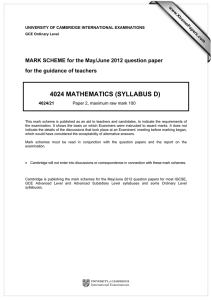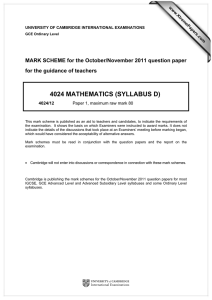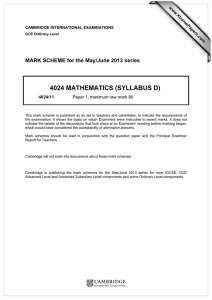MARK SCHEME for the May/June 2006 question paper 4024 MATHEMATICS
advertisement
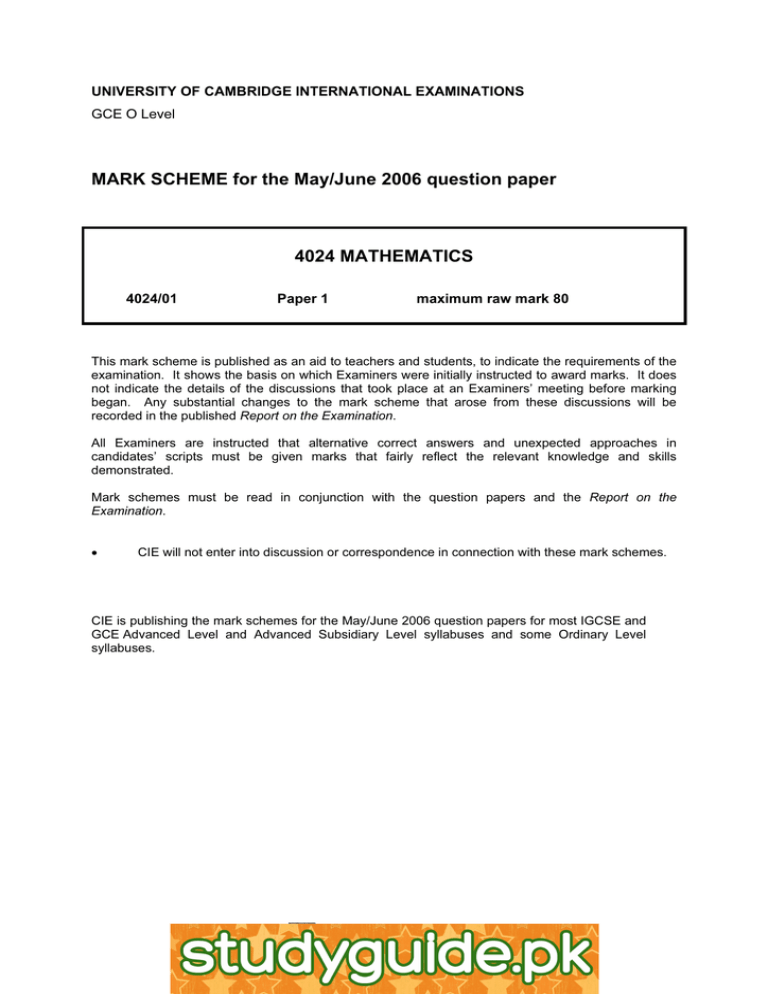
UNIVERSITY OF CAMBRIDGE INTERNATIONAL EXAMINATIONS GCE O Level MARK SCHEME for the May/June 2006 question paper 4024 MATHEMATICS 4024/01 Paper 1 maximum raw mark 80 This mark scheme is published as an aid to teachers and students, to indicate the requirements of the examination. It shows the basis on which Examiners were initially instructed to award marks. It does not indicate the details of the discussions that took place at an Examiners’ meeting before marking began. Any substantial changes to the mark scheme that arose from these discussions will be recorded in the published Report on the Examination. All Examiners are instructed that alternative correct answers and unexpected approaches in candidates’ scripts must be given marks that fairly reflect the relevant knowledge and skills demonstrated. Mark schemes must be read in conjunction with the question papers and the Report on the Examination. • CIE will not enter into discussion or correspondence in connection with these mark schemes. CIE is publishing the mark schemes for the May/June 2006 question papers for most IGCSE and GCE Advanced Level and Advanced Subsidiary Level syllabuses and some Ordinary Level syllabuses. www.xtremepapers.net Mark Scheme Notes Marks are of the following three types: M Method mark, awarded for a valid method applied to the problem. Method marks are not lost for numerical errors, algebraic slips or errors in units. However, it is not usually sufficient for a candidate just to indicate an intention of using some method or just to quote a formula; the formula or idea must be applied to the specific problem in hand, e.g. by substituting the relevant quantities into the formula. Correct application of a formula without the formula being quoted obviously earns the M mark and in some cases an M mark can be implied from a correct answer. C Consolation mark, sometimes awarded for an incorrect answer. places it may be earned in the working. In some • When a part of a question has two or more "method" steps, the M marks are generally independent unless the scheme specifically says otherwise. • FT implies that the candidate has continued correctly after an error. © University of Cambridge International Examinations 2006 www.xtremepapers.net The following abbreviations may be used in a mark scheme or used on the scripts: AG Answer Given on the question paper (so extra checking is needed to ensure that the detailed working leading to the result is valid) BOD Benefit of Doubt (allowed when the validity of a solution may not be absolutely clear) CAO Correct Answer Only (emphasising that no "follow through" from a previous error is allowed) CWO Correct Working Only – often written by a ‘fortuitous' answer FT Follow through ISW Ignore Subsequent Working MR Misread PA Premature Approximation (resulting in basically correct work that is insufficiently accurate) SOI Seen or implied SOS See Other Solution (the candidate makes a better attempt at the same question) © University of Cambridge International Examinations 2006 www.xtremepapers.net Page 1 1 2 3 4 5 6 Mark Scheme GCE O Level – May/June 2006 (a) 52.7 (%) 1 (b) 70 1 (a) 11 21 1 (b) 8 45 1 (a) ($) 336 1 (b) (£) 80 1 (a) 5000 1 (b) 3 1 (a) 40 (km/h) 1 (b) 1.6 (kg) 1 (a) Inversely 1 (b) 9 1 Syllabus 4024 Paper 01 2 2 2 2 2 2 12 7 ($) 640 2 2 12 (100 or 25 ) × 800 125 8 9 (a) 20 30 or 8 30 pm 1 (b) 4 (hours) 1 (a) 4 x 10–6 1 3 (b) 10 (a) (b) 11 M1 oe 2 (0).8 cm 2 3 (i) 6 1 (ii) 8 1 (x =) 2, (y =) 2 1 3 (x =) –7, (y =) –3 3 3 Answer fig 8 or Fig 4 x 2 seen M1 One correct, supporting working or correct method 13 eliminate x or y © University of Cambridge International Examinations 2006 www.xtremepapers.net with C2 to M1 13 Page 2 12 13 (a) 9 2 (b) 80(°) 1 (a) 26 1 (i) x2 cao 1 (ii) x3 cao 1 (a) 75 1 (b) 8 2 (a) 500 (m) 2 (b) k or (0).5 2k 1 (a) 7 1 (i) 50.5 (cm) 1 (ii) 128 (cm) 1 (b) 14 15 16 Mark Scheme GCE O Level – May/June 2006 (b) Syllabus 4024 Paper 01 360 or (2n – 4)90 180 − 140 = 140n oe M1 3 3 3 3 x 5 = 2x – 1 or 3y = 2x – 1 oe seen or 3 x 5 = 2y M1 – 1 or 3x = 2y – 1 Correct method to find M1 area under line 3 Accept − 1 etc. 2 3 15 17 (a) (b) 18 19 20 –12 2, − 15 1 1 oe 2 2 (a) 54(°) 1 (b) 36(°) or 90 – their (a) f.t. 1 (c) (°) 36 or their (b) f.t. 1 (a) –20 1 (b) 9C + 160 oe 5 2 (a) 2.6 (m) cao 1 (b) –(0).5 (m) 1 (c) –(0).8 (m) 2 3 One correct C1 or (2y + 1)(y – 2) seen M1 O < B < 90 required 3 O < C < 90 required 3 9C = 5F – 5 x 32 or 9C M1 = F − 32 5 4 Sum of readings seen 7 13 © University of Cambridge International Examinations 2006 www.xtremepapers.net M1 13 Page 3 21 (a) Mark Scheme GCE O Level – May/June 2006 (i) − − 7 9 13 5 6 8 10 14 7 9 8 10 − − − 16 14 18 Syllabus 4024 Paper 01 1 13 14 16 18 22 (ii) (a) 22 6/25 oe f.t. 1 Follow through from their table (b) 5/25 oe f.t. 1 Follow through from their table (b) 0 (a) NAB = 90° ± 2°, AB = 14.0 ± 1 0.4 cm (b) 1 BAC = 40° ± 2° 1 Perp bisector, 90° ± 2° 1 (ii) 45(.0) to 46.5 (m) 1 (iii) 320° 1 (i) 4 Cuts AB up to 0.2 cm from centre 5 9 23 (a) (i) 3x – 4 1 (ii) x with no wrong working seen 2 (b) 24 (a) (b) 2 Correct factorisation of numerator or denominator Condone missing outside brackets, “=0”, and use of wrong letter if clear 2 (i) 2 0 0 2 1 (ii) Enlargement, with (0, 0), or factor 2 (i) C drawn with vertices at 2 (7, 3), (7, 4), (6, 6) and (6, 7) Accept reasonable freehand sides Shear M1 If only solutions (even incorrect) in answer give mark(s) if factors seen 7(x – 3)(x + 3) (ii) 9 5 Incomplete factorisation seen e.g. 7(x2 – 9) or M1 (7x – 21)(x + 3) etc. centre 1 At least 2 correct vertices or no sides or wrong centre or wrong direction C1 1 Factor 3 and/or x-axis invariant 1 dep 6 11 © University of Cambridge International Examinations 2006 www.xtremepapers.net 11 Page 4 25 Mark Scheme GCE O Level – May/June 2006 Syllabus 4024 (a) 1 2 ,4 oe 2 1 (b) 5 1 (c) 4/3 oe 1 Accept 1.33 or better (d) 3y = 4x + 2 oe 2 Line of gradient their (c) or which passes through (1, 2) or (4, 6) (e) (f) (7, 2) − 3 oe 5 Paper 01 C1 1 f.t. 1 7 Accept - 3 f.t. their(b) 7 © University of Cambridge International Examinations 2006 www.xtremepapers.net 7
